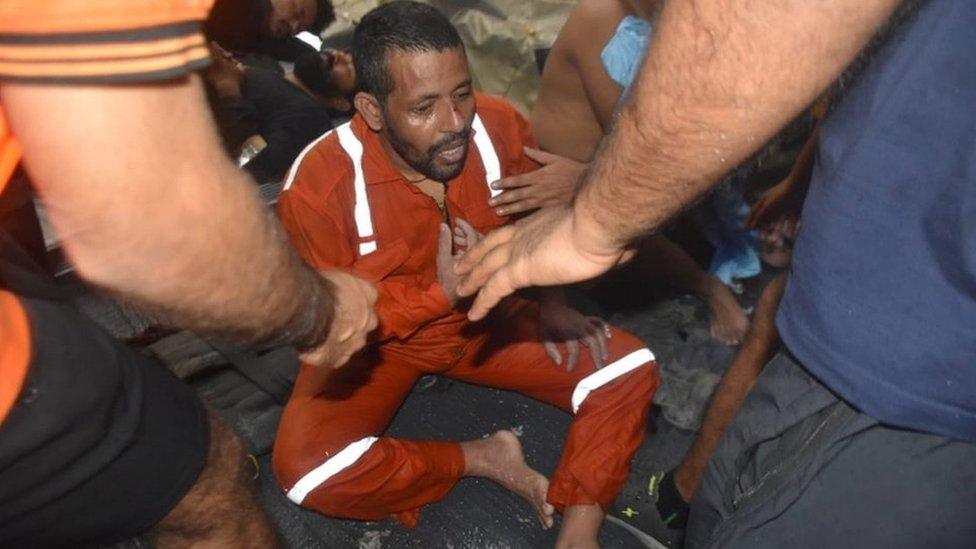Cyclone Biparjoy: India, Pakistan evacuate more than 170,000
- Published
Heavy rains lash Indian and Pakistani coastal areas
Gale force winds and heavy rains are lashing coastal parts of north-west India and southern Pakistan as a powerful cyclone makes landfall.
More than 170,000 people in the two countries were evacuated to safety before the arrival of Cyclone Biparjoy.
Forecasters say it could be the area's worst storm in 25 years and warned it threatens homes and crops in its path.
The cyclone is due to barrel through parts of India's Gujarat state and Sindh province in Pakistan.
Cyclone Biparjoy - meaning "disaster" in Bengali - is forecast to hit the coast near Jakhau port, between Mandvi in Gujarat and Keti Bandar in Sindh.
Pakistan's disaster management agency warned of storm surges as high as 3-4m (10-13ft) along the coastline from Karachi to Gujarat.
Alok Pandey, the official in charge of relief operations in Gujarat, said earlier that the cyclone's intensity had reduced but that wind speeds were still expected to be at "very dangerous" levels of around 110-125 km/h (68-78mph) at the time of landfall.
The Indian armed forces and coast guard have kept ships, helicopters and aircraft on standby for rescue and relief operations.
Gujarat's health minister, Rushikesh Patel, asked people to avoid travelling. "Our aim is to ensure zero casualties," he said.
At least seven deaths were reported amid heavy rains in India earlier this week. The victims included two children crushed by a collapsing wall, and a woman hit by a falling tree while on a motorbike, AFP news agency reported.
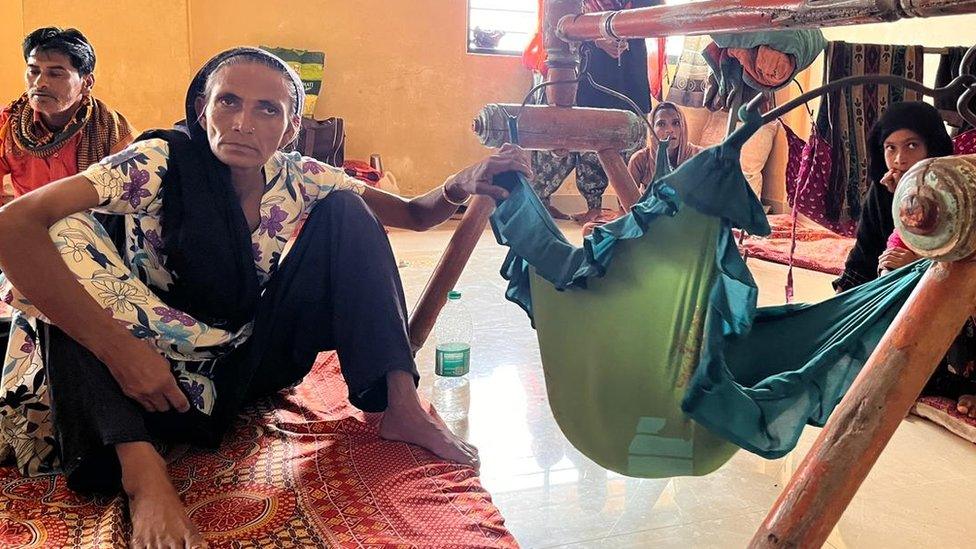
More than 170,000 people in India and Pakistan have been evacuated to shelters and temporary camps
In Pakistan, the storm is expected to strike the coast of Sindh province. Authorities have evacuated 81,000 people from the south-eastern coast and set up 75 relief camps at schools.
Ms Rehman said that Karachi, Pakistan's largest city with a population of more than 20 million, was not under immediate threat but emergency measures were being taken.
Meteorologists warned that high tides could inundate low-lying areas along the coasts.
Mandvi and other parts of coastal Gujarat have witnessed heavy rains and high winds since Wednesday. Local media outlets shared videos that showed debris flying amid heavy rain.
Gujarat state officials said that 94,000 people had been evacuated from coastal areas.
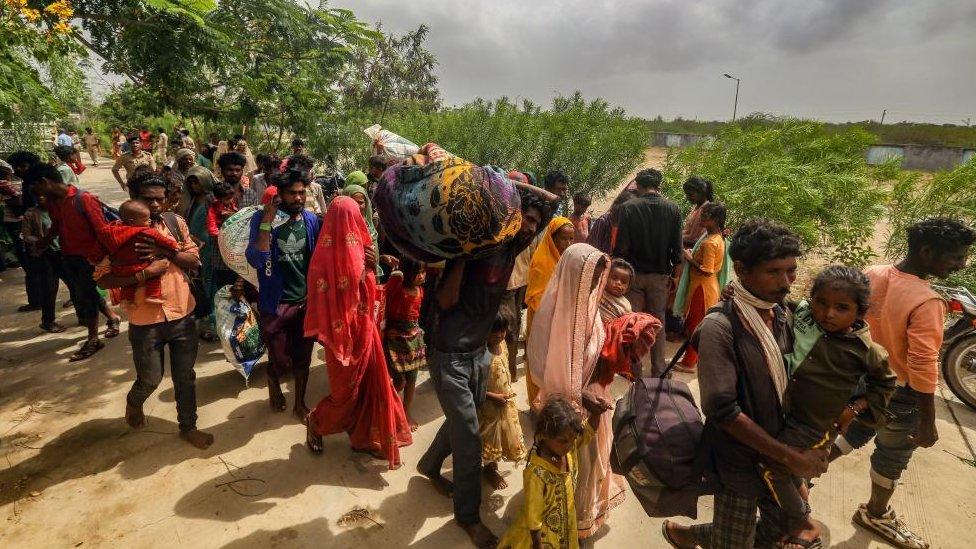
The cyclone is expected to make landfall on Thursday evening local time
A number of train services have been suspended in Gujarat, while the ports of Kandla and Mundra - two of India's largest - have stopped operations, authorities said.
Fishing has been suspended along the Gujarat coast, while fishermen in Pakistan's coastal region have also been warned to stay ashore.
The Gujarat government has also set up control rooms to monitor the safety of Asiatic lions in the Gir forest and coastal areas, BBC Gujarati reported. The Gir forest is the only natural habitat of the Asiatic lion.
Eighteen national disaster relief teams, external and 12 state disaster relief teams have been deployed in key areas of Gujarat for relief work. They will focus on ensuring that essential services remain unaffected or at least restored soon, depending on how strong the cyclone is.
The India Meteorological Department expects Biparjoy to "fall in intensity" as it moves inland.
Ben Rich looks at Cyclone Biparjoy's expected impact as it makes landfall

Cyclones, also known as hurricanes in the North Atlantic and typhoons in the north-west Pacific, are a regular and deadly phenomenon in the Indian Ocean. Rising surface temperatures across the Arabian Sea in recent years due to climate change have made the surrounding regions even more vulnerable to devastating storms.
Cyclone Tauktae in May 2021 was the last severe cyclone that struck in the same region. It killed 174 people.
The evacuations for Biparjoy brought back grim memories from 25 years ago when another cyclone hit the Gujarat coast, leaving a trail of death and destruction. Official figures put the death toll at around 4,000 but unofficially, locals say the number was much higher.
"We have seen cyclones in the past, but this time it looks very bad," said 40-year old Abbas Yakub, a fisherman sheltering at a primary school in Mandvi. He was among 150 people at the temporary shelter.
"Our home is right at the coast, waves already touched our house yesterday morning. We don't know what we will go back to," he said.
At another shelter - a school shielding around 300 people - the youngest inhabitant, Ishaad, was just three days old. His mother Shehnaz, said she was anxious about their future.
"If anything happens to my house, how will I manage with my baby? What will I go back to?"

Are you in India or Pakistan? Have you been affected by the cyclone? You can share your experiences by emailing haveyoursay@bbc.co.uk, external.
Please include a contact number if you are willing to speak to a BBC journalist. You can also get in touch in the following ways:
WhatsApp: +44 7756 165803
Tweet: @BBC_HaveYourSay, external
Please read our terms & conditions and privacy policy
If you are reading this page and can't see the form you will need to visit the mobile version of the BBC website to submit your question or comment or you can email us at HaveYourSay@bbc.co.uk, external. Please include your name, age and location with any submission.
Related topics
- Published12 June 2023
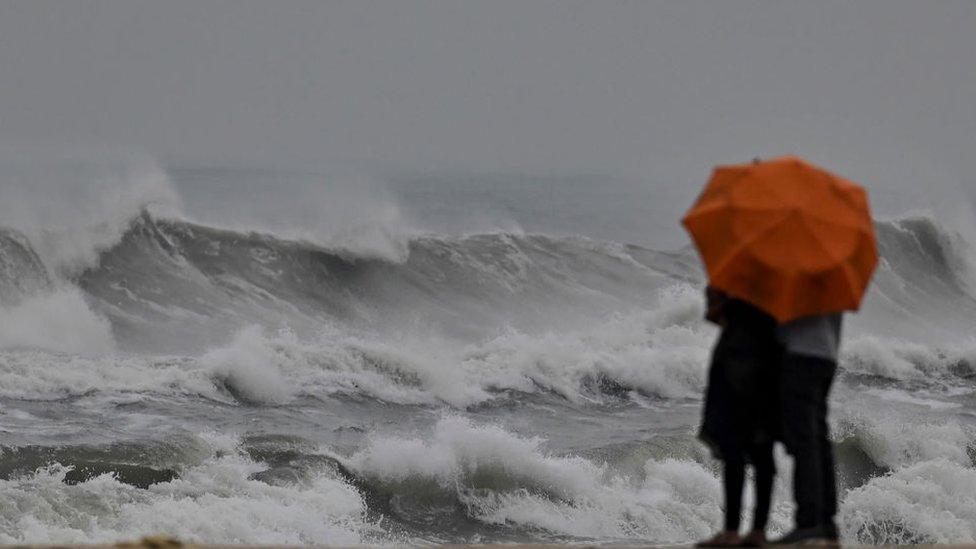
- Published4 October 2022
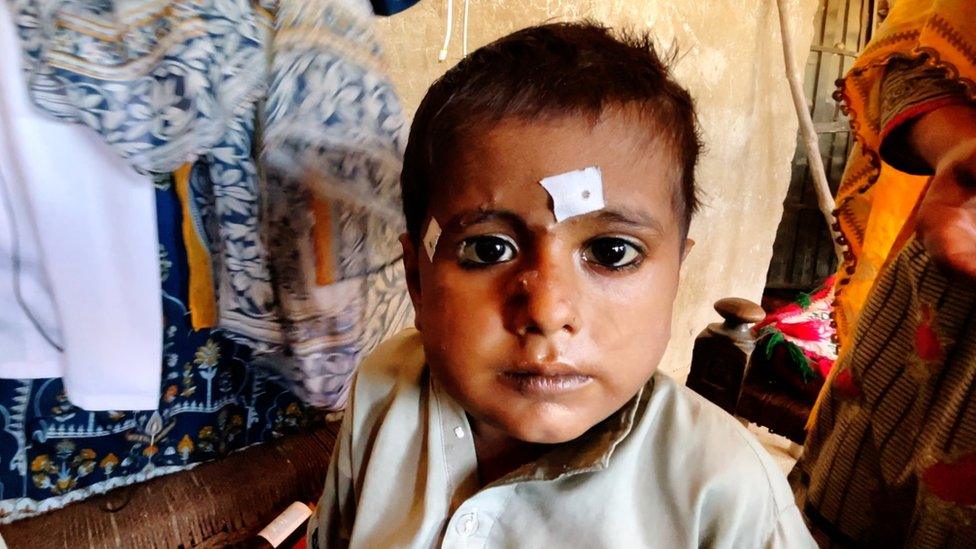
- Published24 May 2021
